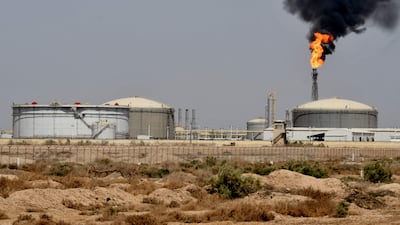Iraq and Saudi Arabia – Opec’s largest crude producers – need to align their views to maintain stability in the oil market, Iraq’s Prime Minister said on Wednesday.
Mohammed Shia Al Sudani, who met Saudi Arabia’s Energy Minister Prince Abdulaziz bin Salman in Baghdad, said he welcomed the entry of the kingdom’s companies into Iraq and discussed expanding economic co-operation, according to a report by the Iraqi News Agency.
“Iraq welcomes the entry of Saudi companies into the Iraqi market, in which there are many great investment opportunities today," Mr Al Sudani said.
He highlighted the “the advanced level” of relations between the two countries, especially in the investment and energy sectors.
Mr Al Sudani stressed the importance of stability in the oil market “under Opec’s umbrella”, in the interests of both producers and consumers.
In December, the Opec+ group of producers agreed to voluntary output cuts of about 2.2 million barrels per day for the first quarter of this year, on top of 3.66 million bpd agreed earlier.
Iraq announced that it would voluntarily cut oil output by 220,000 bpd between January and March.
On Monday, Iraq’s Oil Minister Hayan Abdel Ghani said the country was committed to Opec+ and was currently producing no more than 4 million bpd.
Iraq's current crude oil exports fluctuate between 3.35 million bpd and 3.4 million bpd, he was quoted as saying by Reuters.
Last year, Iraq signed a $27 billion energy agreement with France’s TotalEnergies to develop oil and gas resources and to improve the country’s electricity supply in the biggest single foreign investment in the country at the time.
TotalEnergies will develop a one gigawatt solar power plant to supply electricity to the Basra regional grid. Saudi Arabia's Acwa Power is also set to join the project.
Iraq has also been looking to boost its natural gas production as it heavily relies on imports to feed its power grid.
Meanwhile, Saudi Arabia, the world’s largest oil exporter, is expected to continue playing an active role in balancing the oil market despite its recent decision to lower its production capacity target.
The kingdom “has taken the extra step of announcing additional cuts on multiple occasions, essentially acting as a glue between supporting prices amid a weak consumption outlook”, Rystad Energy said in a research note last week.
Given the current backdrop, the role of core Opec+ members, including Saudi Arabia, is set to evolve from fulfilling demand during a supply crunch to sustained cut management, starting “as soon as next year”, the consultancy said.

